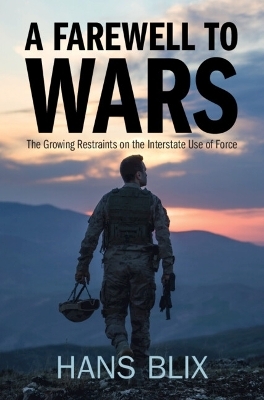
A Farewell to Wars
Cambridge University Press (Verlag)
978-1-009-39255-6 (ISBN)
Since World War II, there has been a trend towards fewer wars, the Russian invasion of the Ukraine standing as a major 'aberration'. With decades of experience as an international lawyer, diplomat and head of UN Iraq inspections, Hans Blix examines conflicts and other developments after World War II. He finds that new restraints on uses of force have emerged from fears about nuclear war, economic interdependence and UN Charter rules. With less interest in the conquest of land, states increasingly use economic or cyber means to battle their adversaries. Such a turn is not free from perils but should perhaps be welcomed as an alternative to previous methods of war. By analysing these new restraints, Blix rejects the fatalistic assumption that there will always be war. He submits that today leading powers are saying farewell to previous patterns of war, instead choosing to continue their competition for power and influence on the battlefields of economy and information.
Hans Blix is a Swedish diplomat who has previously served as Foreign Minister of Sweden (1978–1979), Director-General of the International Atomic Energy Agency (1981–1995) and Chairman of the UN Monitoring, Verification and Inspection Commission for Iraq (2000–2003). He has previously published Disarming Iraq (2004) and Why Nuclear Disarmament Matters (2008).
1. Introduction; 2. Interstate uses of force, tensions, and restraints by regions since World War II; 3. Interstate uses of force, tensions, and restraints during major phases of international relations since World War II; 4. Incentives to the interstate uses of force and restraints; 5. Historical evolution of norms and other means to restrain the use of force; 6. Overview of disincentives to and restraints on the interstate use of force; 7. Military strength to deter others from using force; 8. Nuclear and other non-conventional weapons and means as deterrents and threats; 9. Disarmament as restraint on the use of force; 10. Preventing the interstate use of force by preventing or solving conflicts: mediation, arbitration, fact-finding, diplomacy; 11. Restraints on the interstate use of force through legal norms; 12. UN Charter articles relating to the use of force; 13. The Security Council may use or authorize states or regional organizations to use force; 14. The right to individual and collective self-defence as an exception to Article 2:4; 15. Interventions triggered by factors unforeseen at the adoption of the Charter's ban on the interstate use of force; 16. Interventions seeking regime change, protection of people or punishment; 17. Findings regarding the role of norms to restrain the interstate use of force; 18. States are saying farewell to wars.
| Erscheinungsdatum | 14.11.2023 |
|---|---|
| Zusatzinfo | Worked examples or Exercises |
| Verlagsort | Cambridge |
| Sprache | englisch |
| Gewicht | 642 g |
| Themenwelt | Recht / Steuern ► EU / Internationales Recht |
| Sozialwissenschaften ► Politik / Verwaltung ► Europäische / Internationale Politik | |
| ISBN-10 | 1-009-39255-7 / 1009392557 |
| ISBN-13 | 978-1-009-39255-6 / 9781009392556 |
| Zustand | Neuware |
| Haben Sie eine Frage zum Produkt? |
aus dem Bereich


